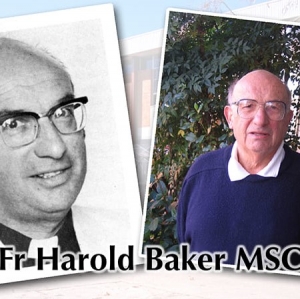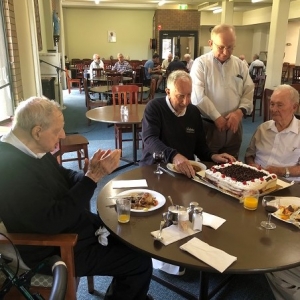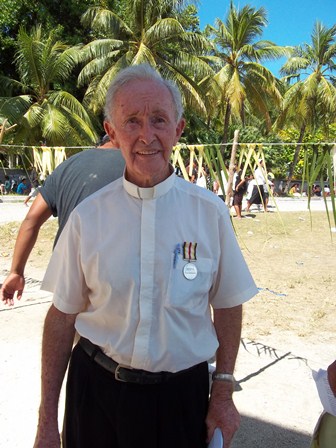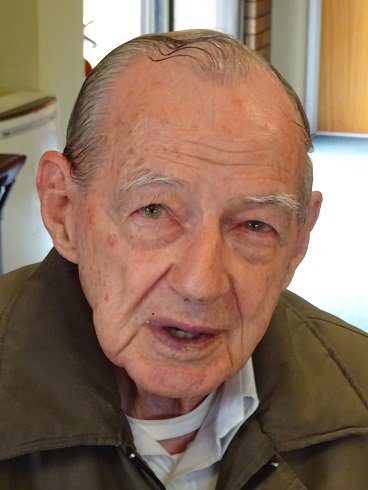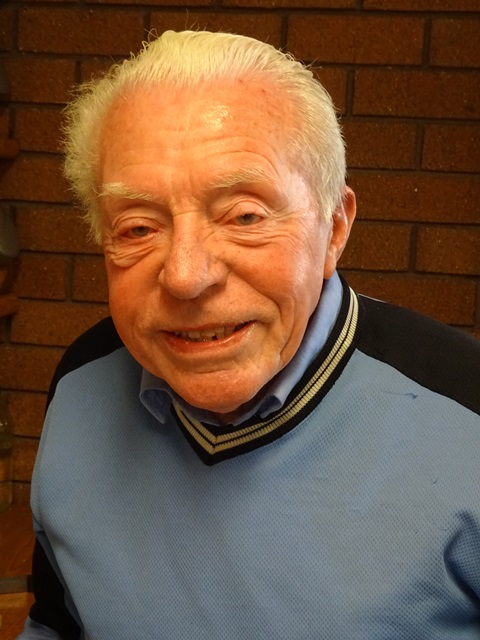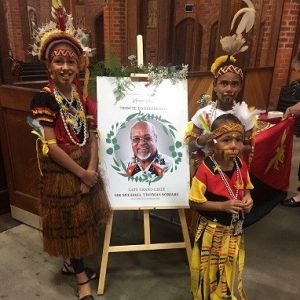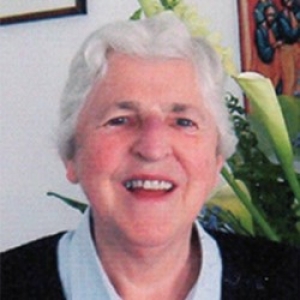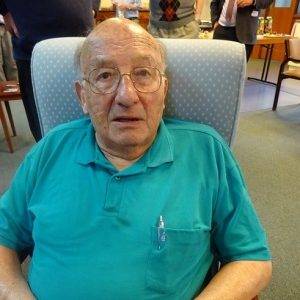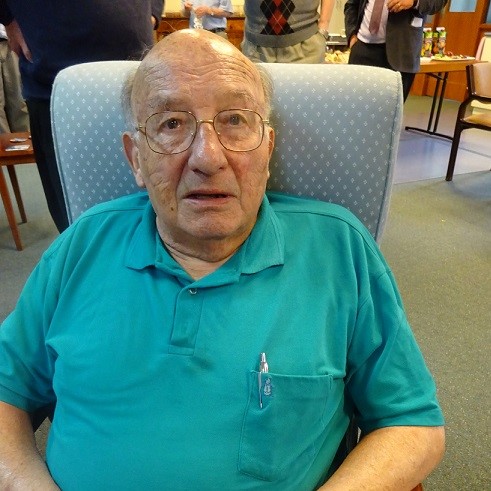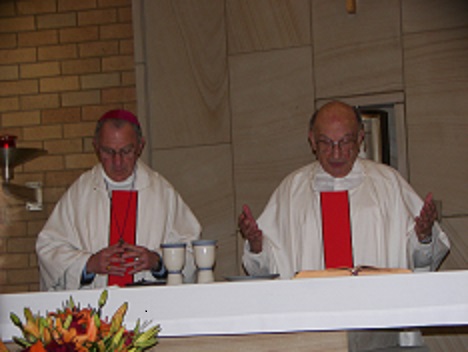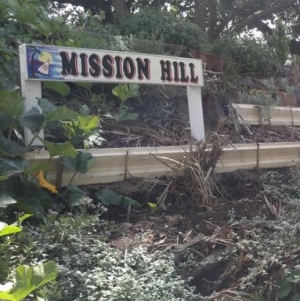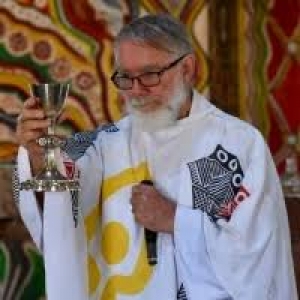Peter MALONE
Harold Baker MSC, eulogy and tributes
Harold Baker MSC, eulogy and tributes
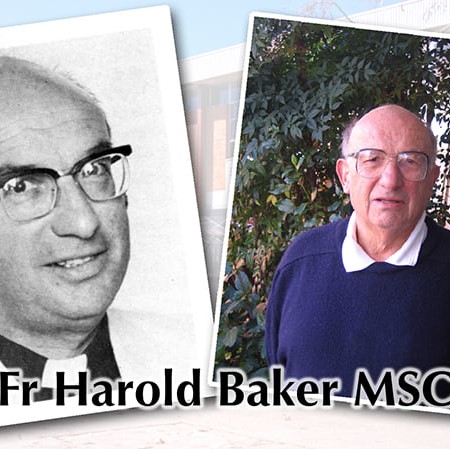
Harold Baker was well esteemed by everyone. His friend and co-community confrere, Jim Littleton, offered this eulogy. Other tributes follow. Funeral photos courtesy of John Walker MSC.
Harold Baker was born in November 1923, just over 97 years ago. He grew up in Rose Bay. He has described his parents as people of "deep faith" who were "very open and enthusiastic and practice of their faith close quote. He came to know the Missionaries of the Sacred friend was the younger brother of an MSC, John McGhee. Harold attended the Apostolic School for the last two years of his secondary education and, after the novitiate, he took his first vows in February 1943.
He completed seven years of seminary training at Croydon monastery and was ordained in Melbourne by Archbishop Mannix in July 1949. He had desires of being a missionary in Papua, but his first appointment was to the teaching staff of Downlands College in Toowoomba, where he gained a love and appreciation of the Ministry of education and remained in that for the rest of his life.
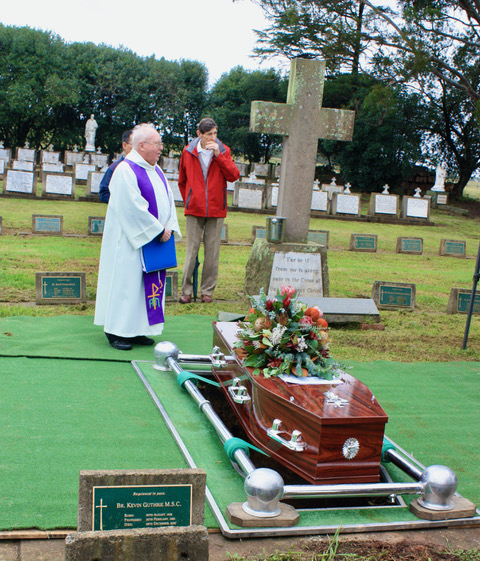
The appointment to Downlands lasted only two years, After which he was appointed to Chevalier College in Bowral initially as College Bursar and later as Sports Master. Being Bursar gave him a lifelong interest in finances, and in later years he was the community Bursar at Daramalan and a member of the Board of Management of Mingarra, MSC residential development of the former Croydon monastery.
After six years at Chevalier College, Harold was transferred back to Downland's as a teacher and dormitory master. I have memories of working with Harold when I was Director of Senior Studies at Downlands, 1962-1965. Con Jordan was the Director of Junior Studies; Harold and Val Patterson were in charge of discipline which we now call Pastoral Care. As four Assistant Principals, we were a strong organisational team supporting a fine Rector, John Mooney.
My memories of Harold from those days are of a very wise and just person who related well with students could understand their issues. He was also the Swimming Coach and I still have memories of him swimming strongly and effortlessly up and down the pool after the students vacated it. No doubt he learned to swim years before at Rose Bay.
Harold had study leave in 1969 it, where he completed a BA degree specialising in Mathematics. He was Principal of Downlands for the next six years. Despite suffering frequently from migraine headaches, he led the College very effectively and represented it well at all public locations. Migraine headaches were an affliction that plagued Harold for much of the rest of his life; he endured it patiently and without complaint.
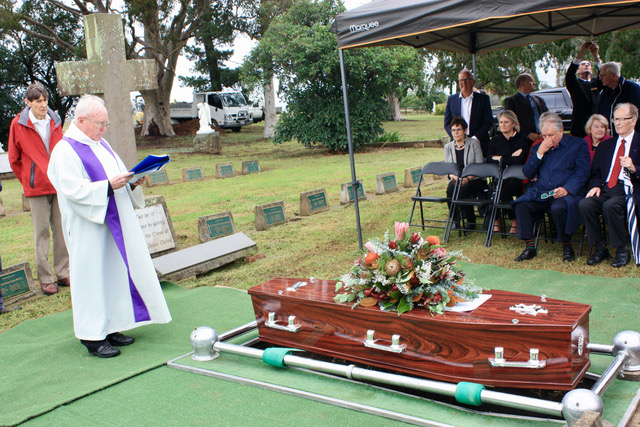
Harold would claim as one of his achievements the introduction of co-education for Years 11 and 12 students at Downlands. Downlands was the first MSC school to do this; the others did the same in the years that followed. It was a joint venture with St Ursula's College. Since then the MSC have always seen co-education as a better preparation for life – one of the boarding houses at Downlands has been named in honour of Harold, Baker House.
When Harold's term as rector of down man's expired, he was transferred to Daramalan College in Canberra where he became the new Deputy Principal and took responsibility for the year 11-12 section of the College, In this capacity he was an excellent support to me as he could be relied upon to gently maintain peace and order in that section of the College time of widespread student unrest in society; and under his guidance the students did change.
Later that year, 1975, Harold and I spent some time in the United States visiting secondary schools from which we hoped to learn something of value that could be implemented at Daramalan. Harold was particularly impressed by a Teacher-Advisor system and was able to implement that at Darmalan soon after. It involved a teacher meeting on a daily basis with about 15 students from different year groups to support, direct and guide them. It has worked well, and, as far as I know, still operates in a modified form.
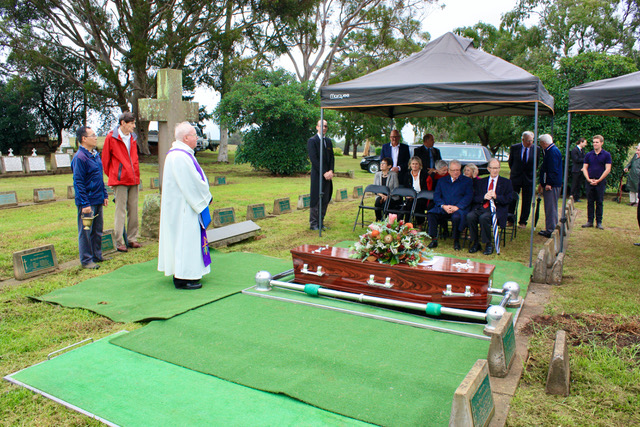
With the advent of co-education for the senior classes at Daramalan in 1977, Harold introduced Ballroom Dancing as an Enrichment subject for years 11-12. It became very popular and soon over 100 students would gather once a week in the evening in McCowage Hall to take the course. Many female students came from the nearby Braddon Catholic Girls High School, now called Meerici College. The course culminated in a Debutante Ball toward the end of the year.
Harold was an excellent dancer himself, very agile on his feet, and enjoyed being able to assist young people towards some of the refinements of education. At the Debutante Ball he looked the part and always the one to whom the debutantes and their partners were presented. On one occasion that person was the Governor-General of Australia. Harold continued this ministry for over 30 years
Harold’s subjects at Daramalan initially were Mathematics and Religious Education. The ACT system of education is different from that of all other states in that it involves both School Based Curriculum and School Based Assessment. Which were distinctly his, while being approved by the Board of Secondary School Studies. They were "Becoming a Person" and "Preparation for Marriage". They were very popular with students. A past student wrote of them in a later College Year Book that "Fr Baker presented illuminating classes on the beauty and dignity of human sexuality.
In July 1999 Harold celebrated the 50th anniversary of his ordination. Bishop Pat Power, whom Harold had taught at Chevalier College years before, and who will be attending the burial at Douglas Park this afternoon, joined us for the celebratory dinner. A past student, Kate Hages, gave the following lovely tribute to Harold on that occasion:
Fr Baker was present to us and our community (Years 11-12) by walking in it. He taught us, spent time with us in the quad, listened deeply and we knew without overt recognition that he was there for us. Only as the years pass do we reflect and appreciate that he lived the lessons of the heart for us."
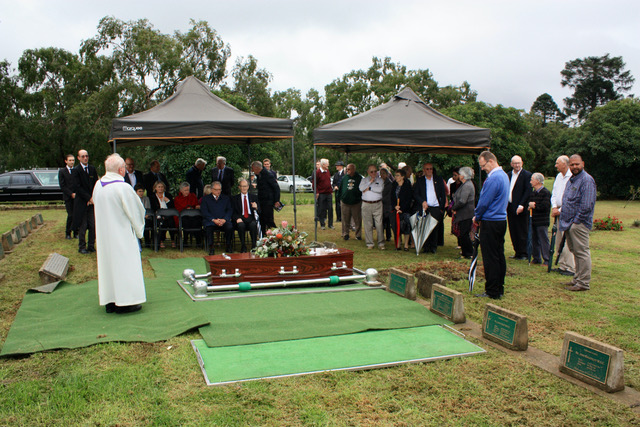
Several hundred Daramalan past students have written similar words of appreciation of Harold on Facebook in recent days.
Ministry extended beyond Daramalan College. Like many of us in the early years, he took his turn in celebrating weekend Masses at Aranda and Page and elsewhere. He fostered for many one of the 4 Lay MSC groups in Canberra. The group met on a monthly basis and appreciated his spiritual insights. Harold was also the chaplain for many years to one of the Teams of Our Lady, and he enjoyed the friendships that this group provided.
In the 1990s Harold produced a variety of leaflets of varying length. One, entitled "The Heritage and Spirit” (24 pages) has been used extensively in all four MSC schools. Another was concerned with the Marian Dimension of the MSC charism. There were others about his "Trekking in Nepal" and his "Experience in Israel"
Harold lived at Daramalan for 45 years, which, of course, is a record. He was the Religious Superior of the MSC community on two occasions and community Bursar for most of those 45 years. He was an exemplary religious. He was always at Community Mass, unless migraine is prevented him. He cherished evening community prayer.
In the things that he mastered. He was wise and prudent in decision-making. He was always a welcoming host to any visitors. He was kind and non-judgemental by nature; rarely have I known him to complain or criticise; he exhibited patience and contentment – in fact he has reminded me of the smiling Buddha. In brief, Harold reflected the MSC charism in a wonderful way and exemplified number 32 of our Constitutions:
"Ours is a spirit of family," formed by kindness and understanding, mutual forgiveness, by gentleness, humility and simplicity, by hospitality "and a sense of humour"
All who have lived with Harold are the richer for the experience. May he rest in the peace of God's love which he cherished.
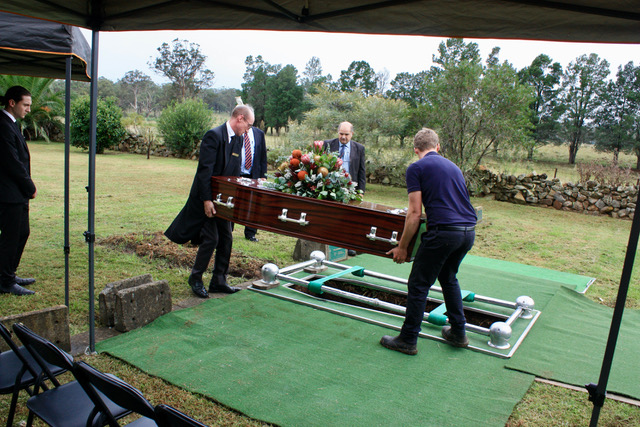
TRIBUTES
From Chevalier College
The following is an excerpt from Fr Franzmann's book "This Many Faceted Gem":
Fr Harold came to Chevalier in 1952 after ordination and two years teaching at Downlands. He was appointed to be the school bursar and to continue his studies of mathematics at university. The plan for studies proved impossible, but while he was bursar he taught General Mathematics to the seniors. In 1955, Fr O'Bryan took over as bursar and Fr Baker was placed in charge of senior discipline and the senior dormitory. Then he also became sports master, in the days when the sports master took a leading role in all of the sports: coach of the first XI, coach of the first XV, manager of the athletics. To a great extent, Fr Baker filled the man of all purposes role that Fr Tyler had until he returned to Downlands at the end of 1956. As bursar, he was involved with all the business dealings of the college, including major undertakings like the purchase of Bosco House and, at the end of his time, the initial planning of the Kelly wing. He cared for maintenance, directing the brothers in their tasks. He is remembered with affection by he senior students he cared for as house master; he taught them Mathematics and Physics, and recalls them with like affection, and is unwilling to accept the assessment they sometime make of themselves that they were a difficult lot in his time".
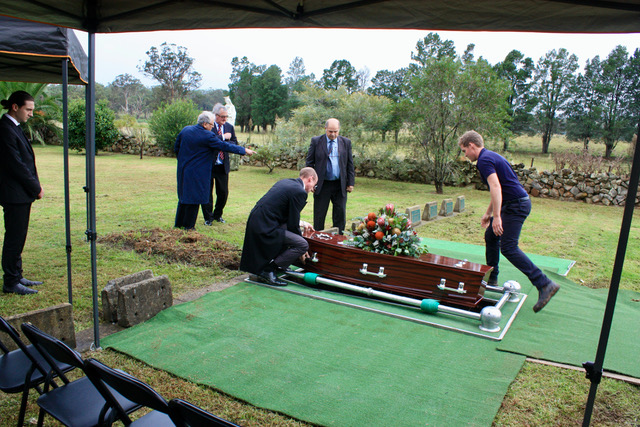
From Downlands
Downlands Magazine 1975, Harold's last year here, has a report on his 25th Jubilee. His parents attended. 25 priests con-celebrated and some 70 priests were present for the occasion from Toowoomba and surrounding dioceses. 19 of those years had been spent at Downlands - the last six as the 8th Rector (1970-75). Many fine tributes were paid to him "for his priestly example, his humane understanding and his unflagging interest in the pillars and the persons that are Downlands."
Fr Val Patterson continues these words of praise in his report in 1976: he writes: "Only the all-knowing Lord. whom he clearly served in all he did, can adequately record what Fr Baker gave to Downlands as priest and teacher, Dormitory Master, friend and guide, Headmaster and Administrator, during his 19 years at Downlands. During his last six years as Rector, the College developed enormously; it was with his initiative and leadership that co-education at downlands was conceived, planned, worked out and made so fruitful. The organizational structure of the school was changed with Form Masters and Subject Masters appointed. The Radford report was introduced and, through many difficulties, was made to work efficiently. Day students were enrolled; Christians of other denominations were welcomed. On the physical side, the Cuskelly Library and additional science rooms were built and the 1975 classroom (Dwyer Hall) block was made possible, planned and begun. Through his many activities in the Association of Independent schools, and the headmasters Conference, the Association of the catholic Schools Principals, the Queensland Priorities Commission of the of the Australian Schools' Commission, through his energy and generosity, he contributed to education in the whole of Queensland. Both downlands and Queensland, I have no hesitation in saying, owe Fr Baker a great debt of gratitude.
Writing in his book, Downlands the First Fifty years, 1981, Fr John Mooney dedicates Chapter 12 to Co-education, (17 pages) and after only 10 years tried to assess Co-education at Downlands and Fr Bakers part in it. In the chapter Fr Baker offers his own impressions of those days.
I dont have any hesitation in naming Harold as a Great Downlander. Vince Carroll MSC
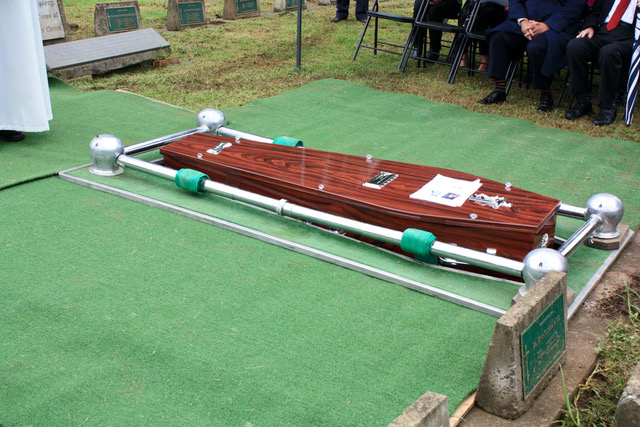
Our MSC Brothers at St Joseph’s, Kensington
Our MSC Brothers at St Joseph’s, Kensington
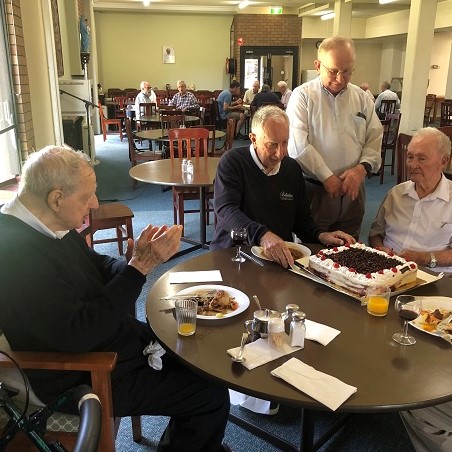
The celebration of the feast of St Joseph yesterday reminds us that 5 of our confreres live at St Joseph’s Home, on the OLSH grounds at Kensington. On Sundays and special occasions, they come to the Monastery - in the photo above, Bernie McGrane and Albert Yelds, and cake, with Tony Young and Steve Dives. Below with Jim Littleton. (Photos thanks to Barry Smith MSC)
We acknowledge them.
Bill Cunningham, many long years in PNG, Eastern Papua.
Albert Yelds, promotion of Devotion to the Sacred Heart, india and many long years in Kiribati.
Bernie McGrane, many long years in PBG, Eastern Papua.
Jos Beelen, migrating from the Netherlands, entering in his 30s, years in colleges and serving at the Generalate In the 1960s.
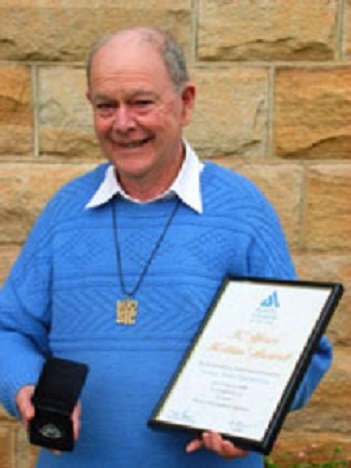
Terry Naughton, years in Education at Daramalan, Novice Master and Retreat House, Douglas Park. (Seen in the photo of receiving his medal as a long-term survivor of Diabetes 1.)
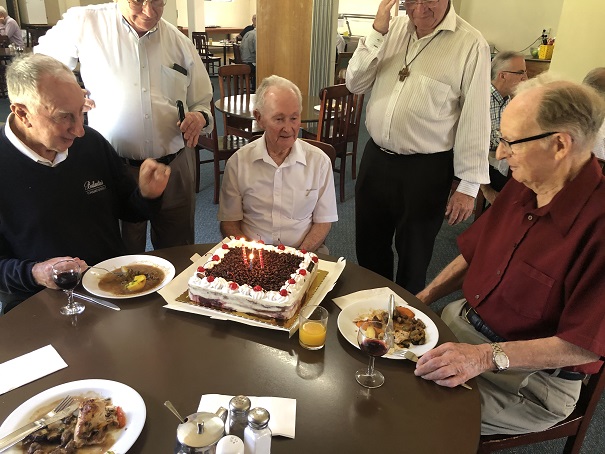
March 19th, St Joseph - and Pope Francis has proclaimed “Year of St Joseph”
March 19th, St Joseph - and Pope Francis has proclaimed “Year of St Joseph”
A collection of different images of Joseph - perhaps a resource for offering something on him in his year. More on May 1st, St Joseph the Worker.
With the Apostolic Letter “Patris corde” (“With a Father’s Heart”), Pope Francis recalls the 150th anniversary of the declaration of Saint Joseph as Patron of the Universal Church. To mark the occasion, the Holy Father has proclaimed a “Year of Saint Joseph” from today, 8 December 2020, to 8 December 2021.
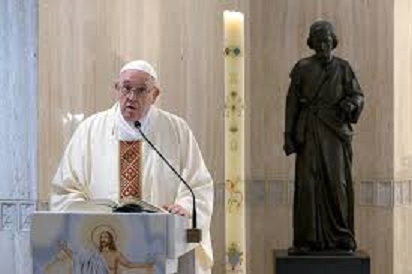
Pope Francis describes Saint Joseph as a beloved father, a tender and loving father, an obedient father, an accepting father; a father who is creatively courageous, a working father, a father in the shadows.
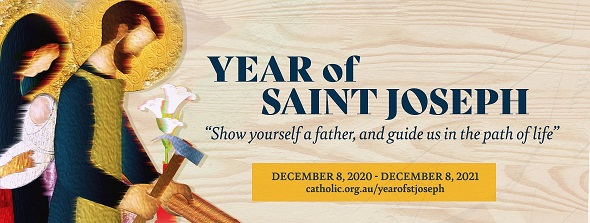
A beloved, tender, obedient father
Saint Joseph, in fact, “concretely expressed his fatherhood” by making an offering of himself in love “a love placed at the service of the Messiah who was growing to maturity in his home,” quoting his predecessor Paul VI.
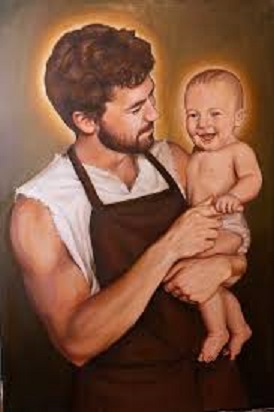
Welcoming the will of God
At the same time, Joseph is “an accepting Father,” because he “accepted Mary unconditionally” — an important gesture even today, says Pope Francis, “in our world where psychological, verbal and physical violence towards women is so evident.” But the Bridegroom of Mary is also the one who, trusting in the Lord, accepts in his life even the events that he does not understand, “setting aside his own ideas” and reconciling himself with his own history.
Joseph’s spiritual path “is not one that explains, but accepts” — which does not mean that he is “resigned.” Instead, he is “courageously and firmly proactive,” because with “Holy Spirit’s gift of fortitude,” and full of hope, he is able “to accept life as it is, with all its contradictions, frustrations and disappointments.” In practice, through St. Joseph, it is as if God were to repeat to us: “Do not be afraid!” because “faith gives meaning to every event, however happy or sad,” and makes us aware that “God can make flowers spring up from stony ground.” Joseph “did not look for shortcuts but confronted reality with open eyes and accepted personal responsibility for it.” For this reason, “he encourages us to accept and welcome others as they are, without exception, and to show special concern for the weak”.
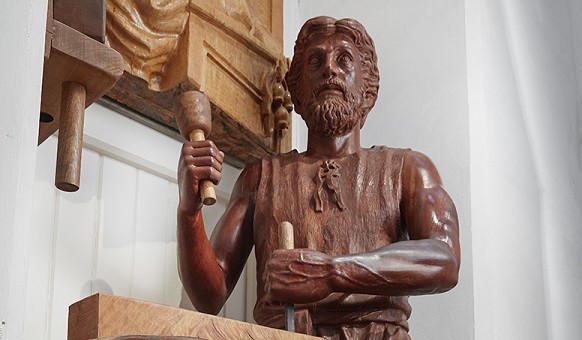
A creatively courageous father, example of love
“the creative courage” of St. Joseph, which “emerges especially in the way we deal with difficulties.” “The carpenter of Nazareth,” explains the Pope, was able to turn a problem into a possibility by trusting in divine providence.” He had to deal with “the concrete problems” his Family faced, problems faced by other families in the world, and especially those of migrants.
In this sense, St. Joseph is “the special patron of all those forced to leave their native lands because of war, hatred, persecution and poverty.” As the guardian of Jesus and Mary, Joseph cannot “be other than the guardian of the Church,” of her motherhood, and of the Body of Christ. “Consequently, every poor, needy, suffering or dying person, every stranger, every prisoner, every infirm person is ‘the child’ whom Joseph continues to protect.”
![]()
A father who teaches the value, dignity and joy of work
“A carpenter who earned an honest living to provide for his family,” St Joseph also teaches us “the value, the dignity and the joy of what it means to eat bread that is the fruit of one’s own labour.”, in favour of work, which has become “a burning social issue” even in countries with a certain level of well-being. “there is a renewed need to appreciate the importance of dignified work, of which Saint Joseph is an exemplary patron,”
Pope Francis encourages everyone “to rediscover the value, the importance and the necessity of work for bringing about a new ‘normal’ from which no one is excluded.” Especially in light of rising unemployment due to the Covid-19 pandemic, the Pope calls everyone to “review our priorities” and to express our firm conviction that no young person, no person at all, no family should be without work!”
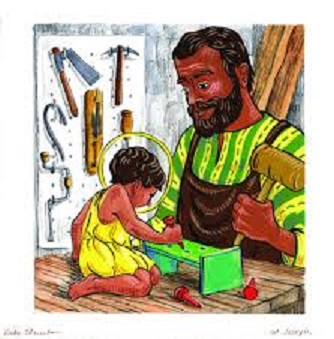
A father “in the shadows,” centred on Mary and Jesus
Taking a cue from The Shadow of the Father — a book by Polish writer Jan Dobraczyński — Pope Francis describes Joseph’s fatherhood of Jesus as “the earthly shadow of the heavenly Father.”
“Fathers are not born, but made,” says Pope Francis. “A man does not become a father simply by bringing a child into the world, but by taking up the responsibility to care for that child.” Unfortunately, in today’s society, children “often seem orphans, lacking fathers” who are able to introduce them “to life and reality.” Children, the Pope says, need fathers who will not try to dominate them, but instead raise them to be “capable of deciding for themselves, enjoying freedom and exploring new possibilities.”
True fathers “refuse to live the lives of their children for them,” and instead respect their freedom. In this sense, says Pope Francis, a father realizes that “he is most a father and an educator at the point when he becomes ‘useless,’ when he sees that his child has become independent and can walk the paths of life unaccompanied.”
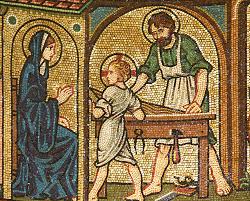
Death and funeral of Sir Michael Somare, the Grand Chief, ‘Father of the Nation’, PNG.
Death and funeral of Sir Michael Somare, the Grand Chief, ‘Father of the Nation’, PNG.
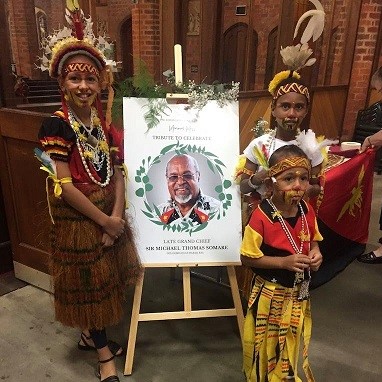
Cardinal John Ribat MSC officiated at his funeral.
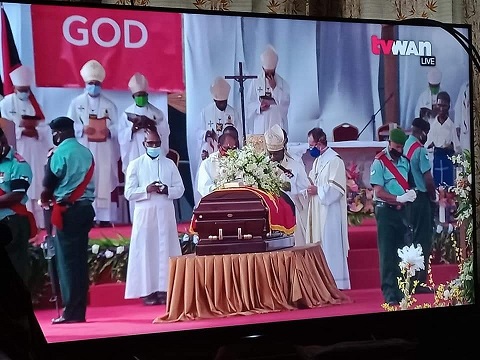
A memorial Mass was held for Sir Michael Somare at Our Lady of the Rosary church, Kensington, on Sunday March 14th. It was organised by Paul Jennings and Roger Purcell in conjunction with the PNG Consulate in Sydney.
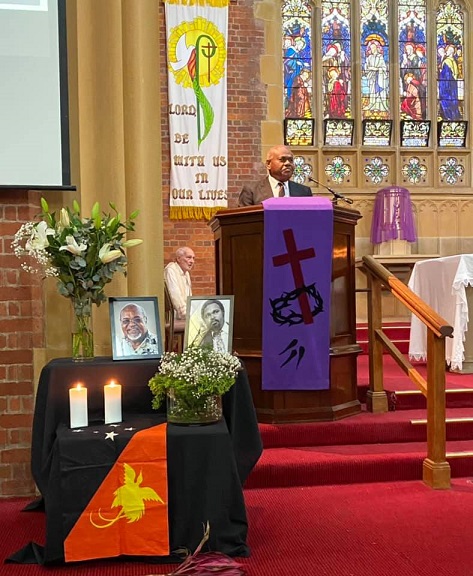
Paul officiated and can be glimpsed in this Mass photo.
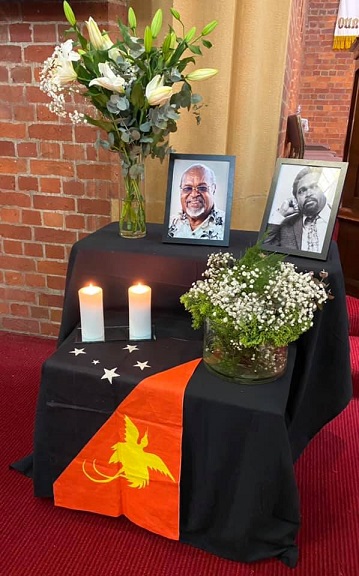
Paul writes MSC knew Sir Michael because he was a parishioner of St Joseph's, Boroko. So Paul Guy would also have known him very well. As well, Adrian Meaney would have worked with him when organising the two Papal visits to PNG. I also met with him several times in 2010 - 2011 when I was invited to his home (at the parliament house in Waigani) on Sunday afternoons. I wasn't sure why I was invited, but we (with his wife and some children) spoke about the spirituality of Sana and about some of his successes as leader. I discerned later (after he went to Singapore in 2012 for six months medical procedures) that he was probably looking for a priest for solace and company.
Paul Jennings’ eulogy:
The life & death of each one of us…………
AMONG ALL THE TRIBUTES AND REFLECTIONS ON THE LIFE AND DEATH OF SIR MICHAEL IN THE PAST WEEKS, ESPECIALLY SHOW THE HEART OF THE MAN.
THE FIRST WAS A PHOTO OF A GROUP OF SCHOOL CHILDREN FROM DEEP IN HELA PROVINCE. THEY HAD PAINTED THEIR FACES WITH WHITE OCHRE AS THEIR SIGN OF MOURNING FOR THEIR FATHER.
THE SECOND WAS A TRIBUTE FROM PETER O’NEIL, PREVIOUS PRIME MINISTER, WHO APOLOGISED TO THE SOMARE FAMILY FOR ANY HURT HE HAD CAUSED SIR MICHAEL AND ASKED FOR FORGIVENESS. HE WROTE THAT HE WAS SURE THE GRAND CHIEF WOULD FORGIVE HIM BECAUSE OF HIS – SOMARE’S – HUMILITY AND KINDNESS OF HEART.
IN HIS BIOGRAPHY – SANA – PUBLISHED IN 1975, SIR MICHAEL SHARED THE SOURCE OF HIS HUMILITY AND GOODNESS OF HEART. SANA IS A SPIRITUALITY WHICH FOCUSES ON TWO PROCESSES. ONE IS THE PROCESS OF WATCHING, BEING ON THE WATCH, WATCHING OUT FOR OPPORTUNITIES; WATCHING OVER OTHERS. A GOOD SHEPHERD.
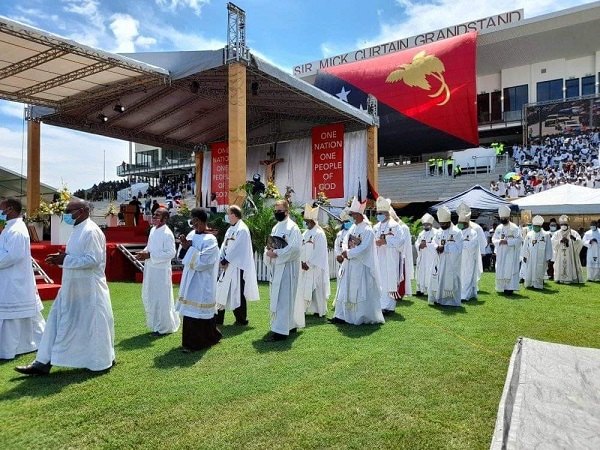
In Port Moresby
THE OTHER PROCESS IS MAKING PEACE. SOMARE WROTE: IF YOU SEE YOUR ENEMY COMING TO FIGHT OR ARGUE WITH YOU, THEN FIRST OF ALL PREPARE A MEAL FOR HIM. INVITE HIM TO EAT WITH YOU. AFTER EATING, YOUR ENEMY MAY BE MORE WILLING TO LISTEN.
AS THE PREAMBLE OF THE NATIONAL CONSTITUTION SAYS: WE REJECT VIOLENCE AND SEEK CONSENSUS AS A WAY OF SOLVING OUR COMMON PROBLEMS.
IN 1978, I WAS WORKING AT ST JOSEPH’S PARISH IN PORT MORESBY, AND ON A SATURDAY MORNING WAS INVITED TO GO ACROSS THE ROAD TO THE INTERNATIONAL PRIMARY SCHOOL AND MEET SOME OF THE PARENTS. SR FLAVIAN, THE HEADMISTRESS HAD ORGANISED PARENTS WORK PARADE AND ALL THE MEN WERE DIGGING UP THE PLAY GROUND AREA TO REMOVE THE ROCKS AND LEVEL IT. THERE, SWINGING A PICK, WAS THE PRIME MINISTER, SIR MICHAEL. HIS SON, ARTHUR WAS A STUDENT AT THE SCHOOL, SO HE FELT IT RIGHT FOR HIM TO WORK WITH THE OTHER PARENTS. GENTLE AND HUMBLE IN SPIRIT.
AS PRIME MINISTER, SIR MICHAEL WAS RESPONSIBLE FOR MANY INITIATIVES THAT WILL LIVE ON FOR MANY YEARS. THESE INITIATIVES WERE ALL CONCERNED WITH WATCHING OUT, ENCOURAGING A SENSE OF NATIONAL UNITY. ONE OF THE FIRST OF THESE WAS THE NATIONAL CONSTITUTION.
THE NATIONAL CONSTITUTION CONTAINS THE STRENGTH OF STRUCTURES THAT HAVE WITHSTOOD THE POWER POLITICS OF THE YEARS. IT CONTAINS THE POETRY OF THE PREAMBLE: IT CONTAINS THE EMPOWERING WORDS OF THE NATIONAL GOALS:
THE FIRST NATIONAL GOAL – INTEGRAL HUMAN DEVELOPMENT – STATES:
We declare our first goal to be for every person to be dynamically involved in the process of freeing himself or herself from every form of domination or oppression so that each man or woman will have the opportunity to develop as a whole person in relationship with others.
EMPOWERMENT OF THE INDIVIDUAL TO ENCOURAGE DEVELOPMENT OF THE WHOLE PERSON.
IN 1985 THE SOMARE GOVERNMENT WAS CONCERNED ABOUT HOW THE ESTABLISHMENTS OF PROVINCIAL GOVERNMENTS WAS THREATENING TO SPLINTER EDUCATION. SIR MICHAEL CONTACTED HIS OLD FRIEND, PAULIAS MATANE, AND ASKED HIM TO ESTABLISH A COMMITTEE TO WRITE A PHILOSOPHY OF EDUCATION FOR PAPUA NEW GUINEA THAT MIGHT BRING SOME UNITY OF VISION. I WAS INVITED ONTO THAT COMMITTEE TO REPRESENT THE CHURCHES.
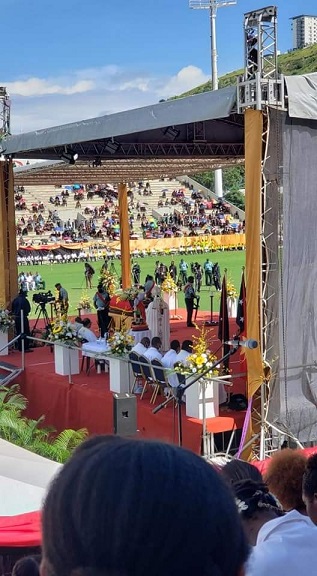
WE DEVELOPED A PHILOSOPHY BASED ON INTEGRAL HUMAN DEVELOPMENT, STRESSING THAT INTEGRAL EDUCATION WAS NOT ONLY ABOUT MIND AND BODY, BUT ALSO EDUCATING HEARTS AND SPIRITS. THERE IS A CONTINUING STRUGGLE BETWEEN THAT PHILOSOPHY AND THE EDUCATIONAL INITIATIVES COMING FROM THE SECULAR WEST.
IN 2008, SIR MICHAEL AGAIN SAW THE NEED TO BRING THE COUNTRY TOGETHER AND MAP A WAY TOWARDS A BETTER FUTURE. HE EMPOWERED A LARGE GROUP OF THE BEST AND BRIGHTEST THINKERS TO DEVELOP A VISION – VISION 2050 – IN THE INTRODUCTION TO THIS DETAILED VISION STATEMENT, SIR MICHAEL WROTE:
After 3 decades since independence, my government has had the courage to step back and reflect on our journey.
Our Vision 2050 provides every man and women, boy and girl in this country with the opportunity for personal development and positive engagement.
We are convinced that we must empower our people with the right education and life skills and provide them with the opportunity to earn an honest living.
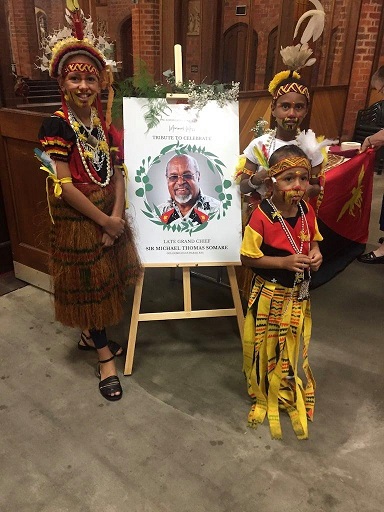
SIR MICHAEL WAS GIVEN MANY HONOURS BY SEVERAL COUNTRIES.
THE COMMONWEALTH AWARDED HIM AS MEMBER OF THE PRIVY COUNCIL, A COMPANION OF HONOUR AND THE KNIGHT GRAND CROSS OF THE ORDER OF ST MICHAEL AND ST GEORGE. THE VATICAN AWARDED HIM AS A KNIGHTOF THE ORDER OF ST GREGORY THE GREAT. JAPAN MADE HIM A MEMBER OF THE ORDER OF THE RISING SUN AND FIJI A COMPANION OF THE ORDER OF FIJI.
IN PAPUA NEW GUINEA HE WAS MADE GRAND COMPANION OF THE ORDER OF LOGOHU.
HE WILL BE BURIED ON TUESDAY AT WEWAK ON KREER HEIGHTS. FROM THERE WE CAN BELIEVE THAT HE WILL CONTINUE HIS WORK AS WATCHMAN, LOOKING OVER PAPUA NEW GUINEA AND WORKING TO UNITE AND EMPOWER HIS PEOPLE. MAY WE PRAISE GOD FOR THE WAYS HE GIFTED PNG THROUGH THE GRAND CHIEF, AND BECOME MORE AWARE OF GOD’S CONTINUED BLESSINGS ON HIS PEOPLE.
An unexpected addition to the MSC Melbourne community
An unexpected addition to the MSC Melbourne community

In these covid days, it has become very difficult for overseas students to come to Australia. This has meant that Tran Van Long is doing a pre-novitiate experience from home in North Vietnam. He is studying English online through the Yarra Theological Union and its ELSPM, English Language Studies for Pastoral Ministry.
He introduces himself with his short bio for ELSPM
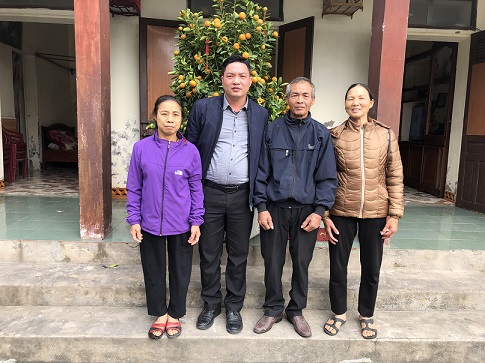
Name: Van Long Tran Date 22 January 2021
I am Tran Van Long. I was born in 1988 and I’m single. I belong to MSC. I was born into a catholic family. My house is in Bao Long village, hamlet 11, My Ha commune, My Loc district, Nam Dinh province. I have finished University and worked as a restaurant manager for a year. My family is 3 brothers, I am the second child. My brother and younger brother were married. I have 4 nephews and 2 nieces. My brother is a driver and younger brother is a worker. My sister-in -law works is a nurse and the sister-in-law is a teacher. My parents are farmers. My parish has 5 thousand people and there are 14 churches. Young people often work as workers in factories and old people are farmers.
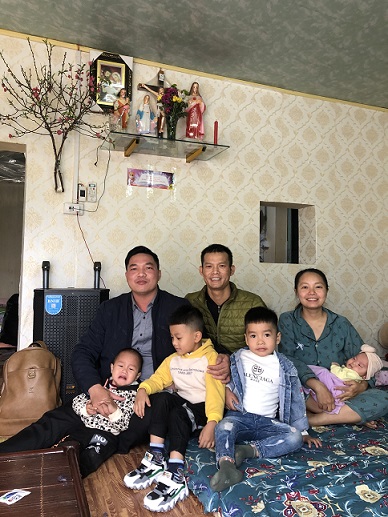
I come from Nam Dinh which is a province in the North of Vietnam. The people in my hometwn are friendly, sociable and pious. The people live to love and help each other. I live in there are 4 seasons: spring, summer atumn and winter. It is winter now. This winter is colder.
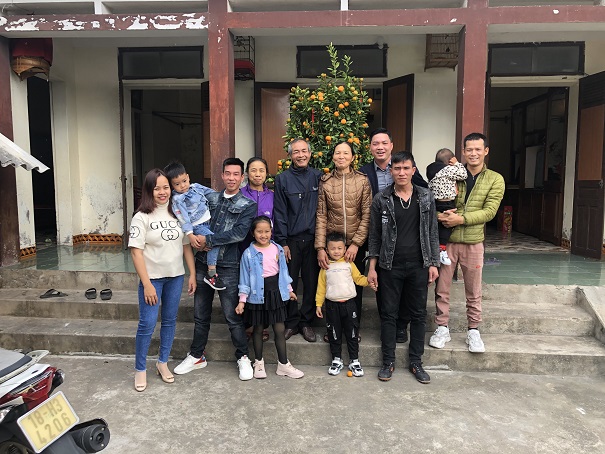
The Melbourne community welcomes him – from a distance.
RIP, Maureen Brazel OLSH
RIP, Maureen Brazel OLSH
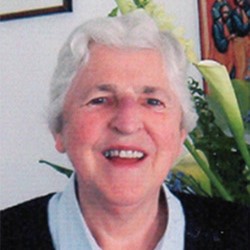
Our sympathies with our OLSH Sisters
My soul is thirsting for God, the God of my life: when can I enter and see the face of God?
These words summarise Sr Maureen’s lifelong journey of faithfulness and loving care for others. Also, her sense of fun and cheerfulness were greatly appreciated by all who had the privilege to live with her.
Maureen Isobel Brazel was born in Colac, Victoria on 24th June 1931. Soon after her birth her parents, John and Margaret, took her to St Mary’s Church in Colac where she was baptised on 5th July 1931. This was the beginning of her life in a home “sound in the practice of the Catholic faith”. They went as a family to Sunday Mass and Parish Missions and her brothers, Frank and Len, were altar boys.
Her father was a grocer and in 1933 the Great Depression was very hard on small shop owners who were very often asked to extend credit to customers and so, her parents made the decision to move to Melbourne. Here her parents ran mixed businesses in Brighton, Armadale, and Middle Park before moving in 1938 into a new house in the burgeoning suburb of Bentleigh. During the War years her father worked in the munitions factory at Maribyrnong and it was at this time that the last two children of the family, Brian and Margaret, were born. Maureen was then enrolled in St Paul’s school Bentleigh and progressed in 1944 to OLSH College Bentleigh where in 1946 when she was 15 years old her “final year class of three students had the rare honour of being the foundation Leaving Certificate class at the College”.
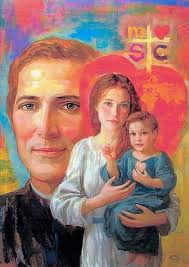
The years of World War 2 when Maureen was between the ages of eight and 14 years old affected her greatly during the whole of her life. Let us listen to what she had to say about this time.
“I can recall the occasion of Australia’s Declaration of War in 1939, when the then Prime Minister gave a radio address to the nation. The years of the War were hard ones – food and clothing rationing, shortage of essentials like petrol for our car, the absence of all luxuries; the going off to war by most able bodied men between the ages of 18 and 35; Air-raid shelters were constructed in back yards, in the shopping centre of Bentleigh and on the playground of St Paul’s. Air-raid drill was part of the school routine and the blacking out of our homes for security purposes was by law. When peace was declared I was in the Intermediate class at the College and I still remember the great relief this brought upon us and the unprecedented celebrations that overtook the nation at this time.”
Before Maureen came to the Novitiate in Hartzer Park on 31st May 1952 she had been working for five years as a typist/clerk in the AMP Society. She credits her time as a typist a significant one, for the skills and experiences she gained there contributed not only to her own growth and development, but also to the contribution she was able to make to our congregation. She was professed as a Daughter of Our Lady of the of the Sacred Heart on 6th January 1954. During the next two years she studied to become a teacher and in subsequent years did much study to obtain a B.A and then later a B.Ed.
![]()
Maureen made her final Vows on 6th January 1957 and then began her long life-ministry as a secondary school teacher, in Kensington, Bentleigh and Corinda. She was an excellent teacher who was greatly appreciated by her pupils and their parents. When contacted about her death the immediate response from her former students was one of praise of her as an excellent teacher, kind, well prepared, made us laugh, ‘we loved her’. Maureen had a genuine love for her students and their families, she fostered the girls’ personal growth as well as their skill development. As they left school many of the girls moved directly into employment that often led to successful careers. She kept in touch with many of her students after they finished school and was a devoted committee member of the OLSH College Kensington Ex-students Association for several years.
Later Maureen was responsible for school administration both as deputy and as principal. In these positions she took great interest in the education and welfare of the girls in the schools and as well as caring for the staff. In the staff room after school Maureen was said to have entertaining, witty and had a great sense of fun; and there were often enjoyable and even hilarious occasions.
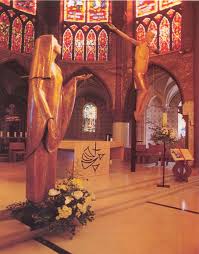
The next many years saw her with much more responsibility in the Province; from 1978 until 2002 Maureen was Superior/ Community Leader in Kensington, Bentleigh, East Bentleigh, Elmore, Botany and Mascot. She took on this role again at Mascot from 2008 until 2012 when she also did varied tasks including parish visitation. Here she was greatly loved by the Parishioners and our Associates as she continued to be a warm, welcoming, friendly presence, running various programs to nurture people’s spiritual life. As Community leader she was very thoughtful of the needs of the sisters and was particularly caring of those who were in any kind of difficulties. When visitors came to the community Maureen was very welcoming, thoughtful, and entertaining.
During these years she was the Provincial Bursar for some time and a member of the Provincial Council. She wrote, “While a member of the provincial team I was privileged to visit our Sisters working in the Philippines, Nauru, and Kiribati and the various houses in Australia. These visits afforded me a broad overall view of our works and the Sisters’ involvement in them; one had to feel great pride in our Sisters for their lives and for all the wonderful work that they had contributed to.”

Sr Maureen was a faithful, prayerful religious and always true to her vocation as a Daughter of Our Lady of the Sacred Heart. She had said that “a religious vocation was always at the back of my mind.” Maureen had told us that all her years have been good ones. Her 14 years at Kensington College were among the happiest and most satisfying years of her life. She wrote, “I worked with Sisters who were gifted, enthusiastic, supportive, dedicated. They led by example and commitment, and many remain among my closest friends.”
In 2018, as Maureen’s health was failing, she joined the community of St Joseph’s at our aged care facility, where she was beautifully cared for until her death.
We thank God for the many gifts given to Sr Maureen, we thank the Brazel family for their gift of her to our religious family. We know Maureen loved her family greatly and held her siblings close to her heart.
We thank you Maureen for your great witness and faith filled, enthusiastic life as a Daughter of Our Lady of the Sacred Heart. May your joyful soul now rest in peace.
RIP, Harold Baker MSC
RIP, Harold Baker MSC
Peter Hendriks writes: Sadly, I just heard from Steve Dives that Harold Baker died this afternoon at 4:30pm. At the time of his death he was in the company of John Walker, Barry Smith and Steve.
Harold was the senior member of the Province.
Concelebrating with Bishop Pat Power
Harold Baker was born on November 27th 1923. He made his religious profession on 26th February 1943. His studies were at Sacred Heart Monastery, Croydon, and was ordained 24th July 1949.
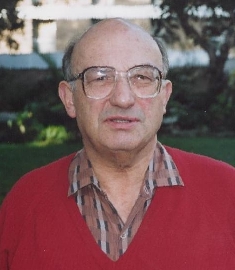
Harold, younger
Harold spent his ministry in MSC Education. He taught at Chevalier College – and the editor of this site can pay tribute to him as in charge of us in our final year at Chevalier, 1956, writing our reports and tutoring us in dancing for the dance with the Elm Court girls, Harold’s father the compere at the dance. Each of us has our memories of Harold.
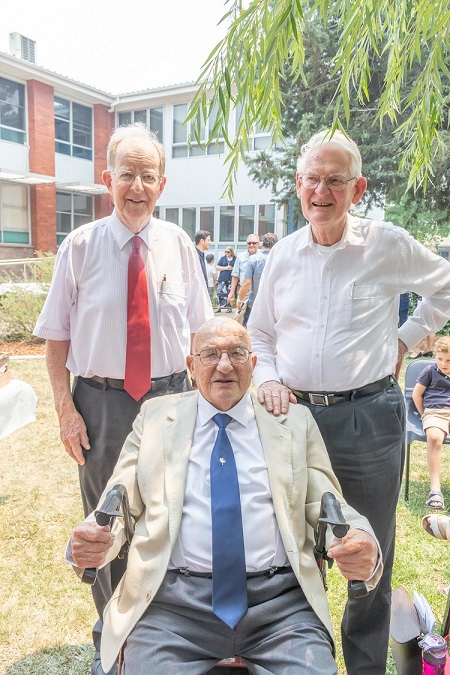
With Jim Littleton and Michael Fallon, farewell from Daramalan
He was Principal at Downlands, but he spent many years, decades, at Daramalan, retiring to the Residence until it was closed in 2019, leading him to final retirement at Kensington.
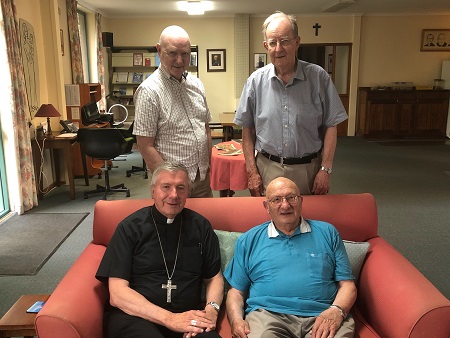
Final Daramalan community, Harold, Jim Littleton, John Walker with Christopher Prowse, Archbishop of Canberra.
On Mission Hill, Kensington
On Mission Hill, Kensington
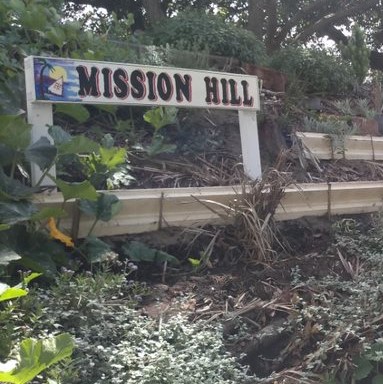
The Kensington community knows Mission Hill. Perhaps some of the rest of us may not be too sure what it is or where it is.
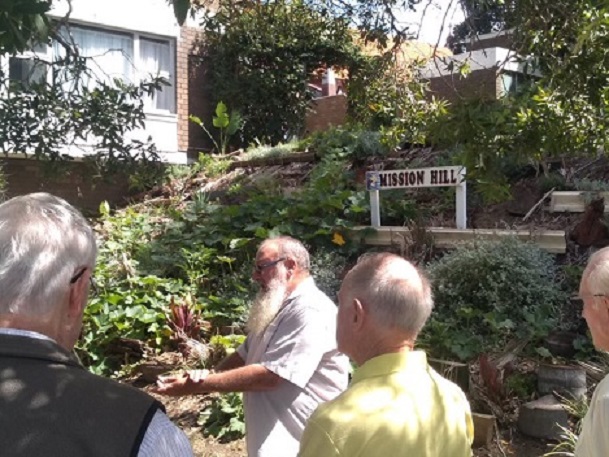
Mission Hill is one of the missions, mission alive, of Roger Purcell, Director of the MSC Mission Office. It is a conservation, recycling project. Compost, digging, planting. And where? In the space between the Monastery and the Chevalier Resource Centre, near the wall of the Centre.
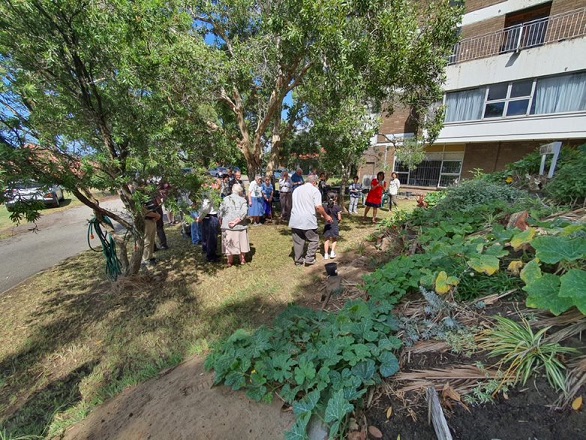
With the recent blessing of the Mission Office, there was also a gathering, MSC community and visitors, to celebrate Mission Hill.
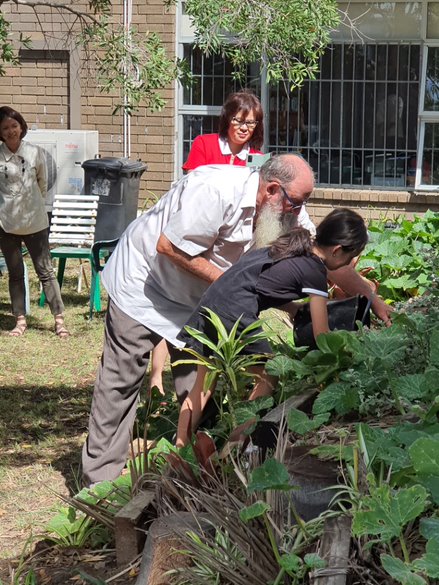
Photos thanks to Sean Donovan of the Mission Office.
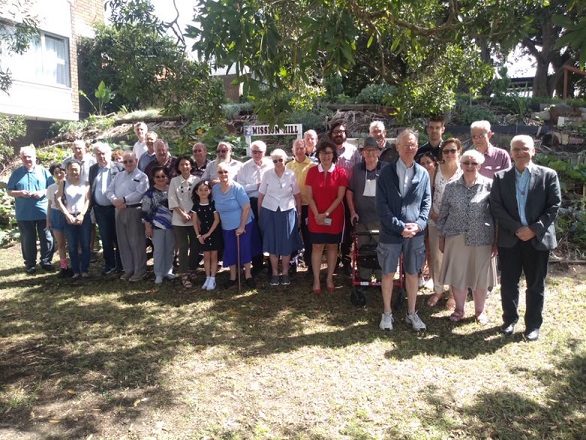
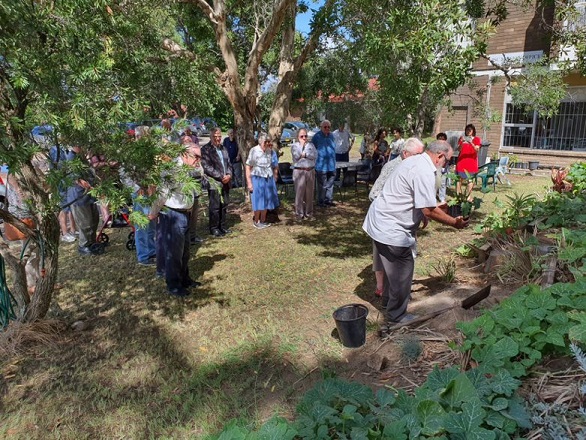
Miriam Rose Ungenmerr, Senior Australian of the Year, Her painting at Mingarra.
Miriam Rose Ungenmerr, Senior Australian of the Year, Her painting at Mingarra.

When our seminary at the Croydon Monastery was sold to the archdiocese of Melbourne in 1991 and became the Croydon parish centre, the chapel extended to become the parish church, a flourishing primary school in the grounds near the cemetery and the building of homes and a residence for the elderly,
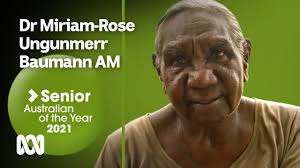
a painting by Miriam Rose Ungenmerr and its explanation were exhibited at Mingarra.
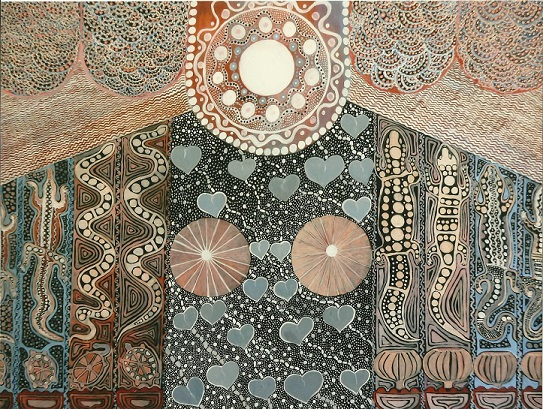
The MSC later sold Mingarra (where there are streets names after Jules Chevalier and other MSC names), but for some time chaplains included Peter Harvey Jackson, John Walker, Roger Duggan and Peter Curry.
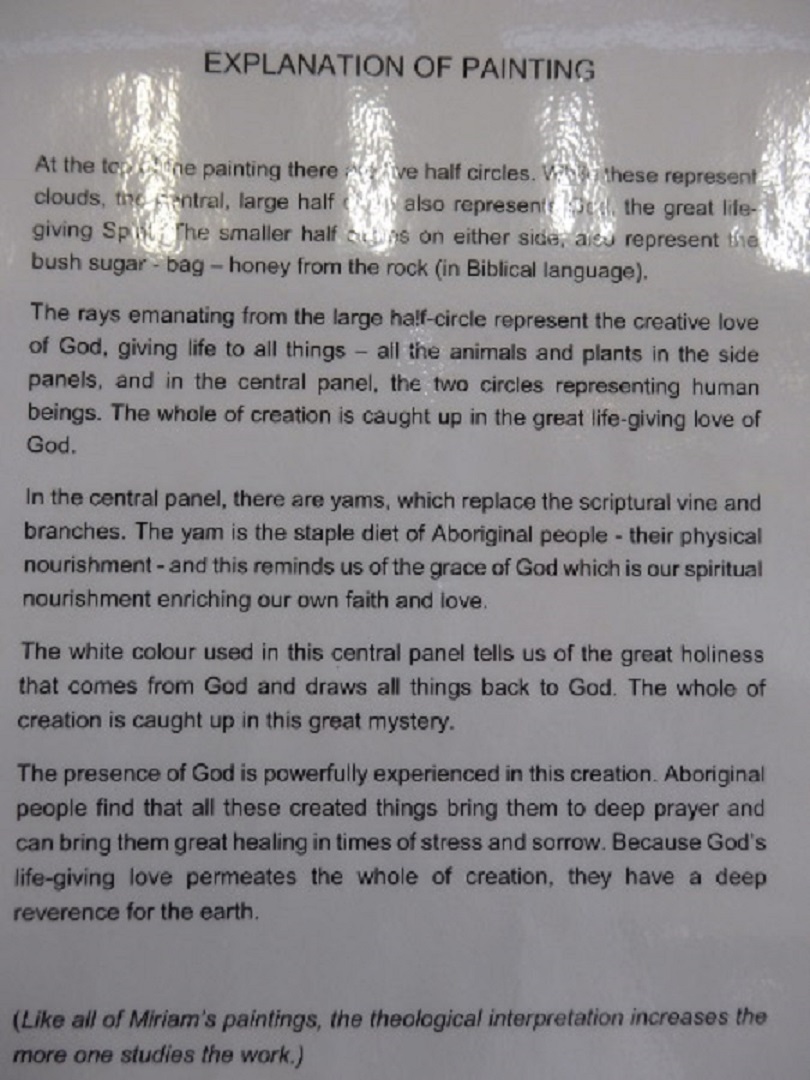
With thanks to Brian Gallagher for the photos.
Bulletin News, Darwin, Vicar General Malcolm Fyfe MSC
Bulletin News, Darwin, Vicar General Malcolm Fyfe MSC
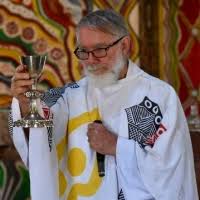
As some of you may know, Father Leo Wearden has been down South since early January, initially on Annual Leave from Wadeye and for a medical check-up. Covid-19 travel restrictions have complicated his movements and extended his time there. Father Leo has authorised me to say that he will be undergoing relatively minor surgery next Wednesday but will hopefully be out of hospital after a couple of days. He has been advised to recuperate fully down South before returning to Wadeye a week or two after Easter.
Meantime ministry at Wadeye and surrounding communities is being managed on a FIFO basis, thanks to the MGLs and the MSCs.
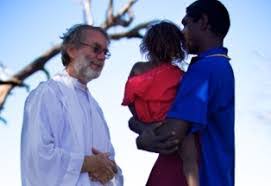
Following on a consultation of priests working in the Aboriginal Ministry, Bishop Charles has appointed Father Leo to be the Dean of the Indigenous Deanery and Co-ordinator of the Aboriginal Apostolate. In this capacity he will be assisted by Regina McCarthy who will attend to the Aboriginal Ministry Desk one day a week at the Diocesan Office.
THE TIWI ISLANDS
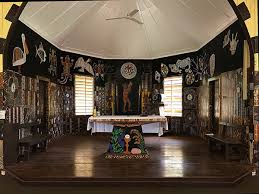
Father Francis Jayakody, who is a priest from the Colombo Archdiocese and who was working for some time in the diocese of Sale VIC, volunteered to work in the diocese of Darwin for the remainder of his Visa period. We were very fortunate in being able to arrange for this transfer, especially as we were losing the services of Father Danh Doan msc and Father Pat Mara msc (on study leave during 2021). Subsequent upon his appointment by Bishop Charles, Father Francis has settled in at Wurrumiyanga and has commenced his ministry on Bathurst Island.
As regards PIrlangimpi and Milikapiti on Melville Island, the diocese has again been fortunate in that Father Joseph Pullanappillil CMI has chosen to return to the Top End after a number of years in Queensland. He has accepted a ministerial appointment from Bishop Charles and will be based at Garden Point. Father Joseph will arrive in Darwin on Monday March 1st and plans to move across to Melville Island within the week. Welcome back Father Joseph!
NORTHERN TERRITORY COUNCIL OF CHURCHES
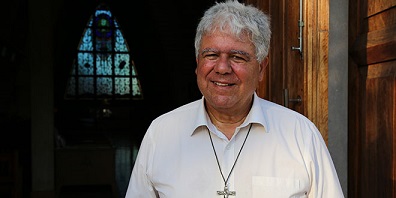
Congratulations to Bishop Charles who at last week’s Annual General Meeting of the NTCC was elected to be Chairperson. This appointment is essentially a year by year one but usually turns out to be a longer term one.
AND FINALLY SOME HISTORY.
After I sent out the notice about Regina McCarthy’s appointment as Catholic Dean at Nungalinya College and mentioned her father, Peter’s lay missionary work at Daly River, I received this message from Margaret Flynn:

“I read your email about Regina McCarthy.
I just wanted to add something about the McCarthy connection. In the mid-sixties 5 McCarthy men came up to Darwin from Sydney as lay missionaries. They were Terry and his brother Eris and their 3 cousins, Peter, Bob and Harry. All of them were tradesmen and built numerous mission buildings, mainly schools.
When I first went to Bathurst Island in 1969 Terry and Eris were both there and the other 3 men were at Daly River. Of course some stayed in the Territory a long time - Peter and Bob married women from Daly River and Terry married the lay missionary Mary Neville who was teaching at Port Keats.
So Regina comes from a wonderful family who have given so much service to the Diocese of Darwin.”
